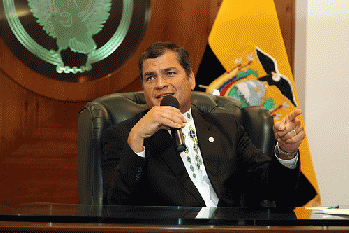Stansfield Smith, ChicagoALBASolidarity.wordpress.com
Ecuador's transformation during the presidency of Rafael Correa (2007-2017) and the Citizens Revolution stands as great step forward for the worldwide struggle against the 1%. President Correa, who leaves office May 24, came to power in a country controlled by a super-rich elite, dependent on oil and commodities exports. Ecuador still suffered from the devastating effects of corrupt banker dealings, which caused the currency and peoples' savings to lose two-thirds of their value, leading to the US dollar becoming the new national currency. Governments preceding Correa instituted neoliberal austerity and privatization programs, causing inequality, poverty and unemployment to soar. Ecuador became one of the poorest and least developed nations in the region. Poverty rates reached 56% of the population, and from 1998-2003 close to 2 million Ecuadorans out of a population of 12-13 million, over 1 in 10, had left the country for economic reasons.
William Blum, in Killing Hope, wrote that the CIA in Ecuador "infiltrated, often at the highest levels, almost all political organizations of significance, from the far left to the far right." "In virtually every department of the Ecuadorian government could be found men occupying positions high and low who collaborated with the CIA for money. At one point, the agency could count among this number the men who were second and third in power in the country."[1] Ecuador was also saddled with the US's largest air base in the region at Manta, instrumental in Plan Colombia and in enforcing international banking and corporate rule over Ecuador.
Ecuador's economic collapse and social explosion was similar to Greece's a few years later. But in 2006, after nine presidents in ten years, the Ecuadoran people elected Rafael Correa, who was no capitulating Greek Syriza Prime Minister Tsipras or Berrnie Sanders. Correa's government carried out programs that peoples in progressive social movements have advocated throughout the West, if not the world. Ecuador provides an example for what Greece could have done when its crisis hit, if it had a firm anti-neoliberal, anti-imperialist leadership.
Ecuador's Citizens Revolution, not a socialist revolution as in Cuba, arose from a popular repudiation of neoliberalism and neocolonialism, similar to Chavista Venezuela and Evo's Bolivia. It shows what can be accomplished with social programs and infrastructure investments when national wealth is redirected to benefit the majority instead of the 1%, while still confined in a capitalist system.
What did Rafael Correa do?
Correa was fortunate to be part of a South American resurgence, exemplified by the 1998 election victory of Hugo Chavez, which stimulated anti-neoliberal anti-imperialist movements also coming to power in Bolivia and to a much lesser extent in Brazil and Argentina. As
With Chavez' Venezuela and Evo's Bolivia, Ecuador approved a new constitution by national referendum that includes a new social contract enshrining the rights of Mother Earth, the rights of Original Peoples, and protections for national sovereignty over natural resources.
Correa rejected IMF and World Bank policies, which had made Ecuador numerous loans to entrap the country in debt, a way for the imperial countries to dominate the rest of the world. Ecuador's debt was $14 billion in 1980, the country paid back $7 billion, and it still owed $14 billion. The IMF demanded cuts in wages and state budgets, that 80% of the oil revenues go to debt payment, or it would use international courts to seize their ships and their contents.
Correa renounced $3.9 billion of the debt (one-third of the total) found to be illegitimate, showing, he said, "government has the power to cancel debt" with clear lessons for Greece, Spain and Ireland. The savings were invested in people's needs.
His government increased taxes on the rich, and cut down on tax evasion which bled government revenues . "The government is now collecting the taxes owed by companies " which Correa half-jokingly said was "a radical innovation in the capitalist world." Government fund s quadrupled . He also instituted a tax on capital flight, generating $1 billion in revenue between 2012-2015.[2]
He required the Central Bank to repatriate billions in assets held abroad, and renegotiated oil contracts with multinationals on much more favorable terms. These new funds enabled the government to triple investments in infrastructure and public services, such as housing, free education and health care. The economy was diversifying, away from dependence on oil, so that now non-oil exports account for 64% of export income.
These measures enabled Ecuador to experience 4.2% annual growth from 2007-2015, even during the 2008-2009 international financial crisis brought on by Wall Street corruption. Not only has its economic growth been among the best in the region, but it has favored the poorest in the country, making Ecuador a leader in reducing inequality. Unemployment is now down to 5.2%.
Since 2014 the national income shrank as oil and commodity prices hit near record lows. In 2016 Ecuador was hit by a major earthquake, its worst natural disaster in 70 years, killing 668 people, and causing $3.3 billion in damages, equal to 3% of the GDP, harming the economy. Ecuador has also been hurt by the rise in the dollar, making its exports more expensive. These combined to create a recession in Ecuador, after years of impressive growth. However, by December 2016, the rate of economic growth had risen to 3.3%, with an inflation rate of only 1%
Contrary to stories that Ecuador is now crushed by debts to China (which stepped in after Western banks cut lending), the country actually reports one of the lowest debt levels in Latin America. At the end of 2016 Ecuador reported a foreign debt of 25.7% relative to the GDP and its total debt is 26.9%. This is lower than under preceding presidents.
Next Page 1 | 2 | 3 | 4 | 5 | 6 | 7
(Note: You can view every article as one long page if you sign up as an Advocate Member, or higher).






